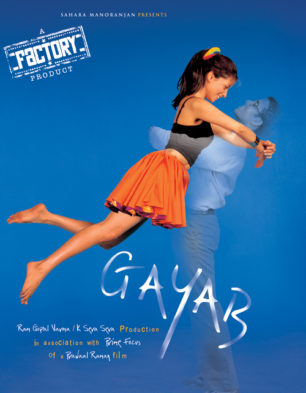Gayab Review {1.5/5} & Review Rating
A genre like the one attempted in GAYAB has not been witnessed with rapid regularity in Hindi films. Of course, there has been MR. X IN BOMBAY, MR. INDIA and the two desi versions of GHOST, MAA and PYAAR KA SAAYA, in the past.
And now GAYAB.
But novel ideas don't necessarily develop into path-breaking films. GAYAB has its share of engrossing moments, but they're few and far between. Unlike MR. INDIA, which appealed from age group 6 to 60, GAYAB neither completely satiates the kids, nor those looking for wholesome entertainment.
Somewhere, as it progresses, the screenplay gets gayab and what you carry home are a handful of deftly executed sequences. But a handful of high-quality scenes are no compensation in a 2-hour flick!
Let's just say, GAYAB was ripe with potential that succumbed completely to trite and tepid Bollywood convention.
Vishnu Prasad [Tusshar Kapoor] is a loser in life. He lacks self-confidence and the attitude to lead a normal life.
Having an unmatched knack of attracting problems, his life doesn't get any easier, courtesy a nagging mother [Rasika Joshi], who takes pride in beating up Vishu given the slightest opportunity.
His father [Raghuveer Yadav], a henpecked husband, is petrified to raise a voice, let alone take his side. Mohini [Antra Mali], the love of Vishnu's life, doesn't even know his existence and her boyfriend [Raman Trikha] wants to break his bones.
Disappointed and frustrated with life, he prays to God to make him gayab? And the wish is granted!
An original piece of work? Nope! Flashes of THE INVISIBLE MAN [1933] and the more recent HOLLOW MAN [2000] cross your mind as you watch GAYAB. Unfortunately, GAYAB is an interesting idea gone haywire. When stretched into a 2-hour film, it just doesn't hold.
GAYAB has its moments of glory. And these moments come in the initial reels itself. Depicting the protagonist as a loser at the very start of the film was the proper way to set in motion the story. The turning point in the tale, when Vishnu becomes invisible, though not having a strong impact, still keeps the viewer's interest alive.
But the film goes haywire in the latter part. The focus suddenly shifts to the one-sided romance and how Vishnu wants to possess the girl. Nothing wrong with that, but the way screenplay writers Kona Venkat and Prawaal Raman go about it makes you only realize that a sound idea can go awry with amateurish writing.
Whatever little impression the film makes in the first half, it blows it away in the post-interval portions. The thrill and excitement associated with an invisible man movie is completely missing in this half. If the effort was to make you laugh, sorry, it doesn't. If the endeavour was to pull your heartstrings, it doesn't either.
The car-bike chase in the second half and to an extent the scene when Tusshar and Antra meet in a secluded mill is worthy of mention. But the climax is a complete letdown from the writing point of view. Antra's sudden change of heart [towards Tusshar] is difficult to absorb. Even Tusshar surrendering himself to the law [he continues to be invisible till the very end!] looks plain ridiculous. Frankly, one does miss some surreal scenes and a nail-biting finale.
Another drawback of the film is its music [Ajay Atul, Amar Mohile] and the placement of songs. In fact, the songs only seem like an excuse for a generous display of skin show, which is only a forced ingredient in a film like this.
Director Prawaal Raman has yet to grasp the art of writing the screenplay and giving it an interesting form, thereby mesmerizing the viewer for the next two hours. In fact, GAYAB also looks like a 2-hour version of one of the six stories of DARNA MANA HAI, featuring Aftab Shivdasani and Isha Koppikar. Besides, it lacks terror and suspense - so vital in a film like this!
Cinematography [Pietro Zuercher] is consistent. Special effects [Huzefa Lokhandwala] are decent at times, but tacky at most places. Even otherwise, great special effects do not a great movie make.
Tusshar looks the character he has been assigned to portray and he does it well. Antra Mali just doesn't deliver. Raman Trikha is adequate. Govind Namdeo and Raghuveer Yadav are as usual. Rasika Joshi tends to go overboard at times, but stands out due to her characterization.
On the whole, GAYAB is strong on hype, but weak in content. The USP of the film is the invisible factor in the story, but an amateur screenplay ruins the show. At the box-office, GAYAB might attract the multiplex audience for a day or two thanks to its aggressive promotion, but after the word is out, the drop in its collections will be inevitable. Business in Mumbai should prove to be slightly better, but in most circuits it will face an uphill task!


